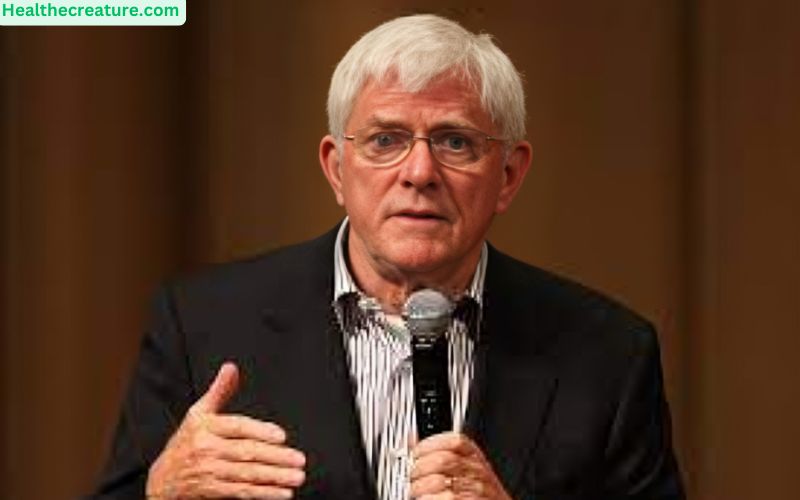Phil Donahue, a revolutionary figure in American television, remains a name synonymous with intelligent, thought-provoking talk shows. As the creator and host of The Phil Donahue Show, Donahue’s innovative approach to audience engagement reshaped daytime television. His legacy is profound, but in recent years, public speculation about his health began to circulate, fueled by his age and decreasing public appearances. This article explores the narrative surrounding Donahue’s health, addresses common rumors, and celebrates his enduring influence.
Phil Donahue: A Lifetime of Achievements
Born in Cleveland, Ohio, on December 21, 1935, Phil Donahue’s career began modestly as a local news anchor and radio talk show host. By 1967, he launched what would become The Phil Donahue Show, pioneering a format where the audience actively participated in discussions.
Donahue didn’t shy away from controversial topics, tackling issues like civil rights, abortion, and LGBTQ+ rights when few dared to do so. His empathetic interviewing style earned him a reputation as a bold yet compassionate host. Over his career, Donahue won 20 Daytime Emmy Awards, further solidifying his legacy.
After retiring from his daily show in 1996, Donahue remained a visible figure for several years, participating in interviews, public speaking engagements, and advocacy work. However, as he aged, his presence in the public sphere diminished, leading to speculation about his health.
Public Interest in Donahue’s Health

Fans’ curiosity about Donahue’s health grew in the 2010s as his public appearances became less frequent. Aging inevitably invites questions about health, especially for public figures. For someone like Donahue, who maintained an active career for decades, the shift to a quieter life sparked widespread interest.
Reports about Donahue’s health were largely speculative. Some rumors suggested he might be battling dementia, a condition affecting millions of older adults worldwide. Others pointed to the possibility of a stroke, often cited as a leading cause of disability among the elderly. These speculations were never confirmed by Donahue or his family.
Exploring Dementia Rumors
Dementia is a syndrome associated with a decline in memory, reasoning, and problem-solving abilities. It affects nearly 55 million people globally, with risks increasing significantly after the age of 65. Symptoms can range from mild memory lapses to severe cognitive impairments, often interfering with daily life.
Rumors about Donahue’s potential dementia seemed to stem from his reduced media presence. Fans noted a lack of public interviews or statements, interpreting his absence as evidence of cognitive decline. However, no verifiable sources ever confirmed these claims. Donahue’s withdrawal from the limelight may simply reflect a desire for privacy during retirement, rather than a struggle with dementia.
Stroke Speculations
Another health issue frequently associated with aging is stroke. A stroke occurs when the blood supply to a part of the brain is interrupted, often resulting in significant neurological and physical impairments. Symptoms can include paralysis, difficulty speaking, and memory issues.
Speculation about Donahue experiencing a stroke arose alongside similar rumors about his wife, Marlo Thomas. Observers noted subtle changes in her appearance and attributed them to possible health issues. Despite these claims, neither Donahue nor Thomas publicly addressed such concerns.
The Complexity of Aging in the Public Eye
The narratives surrounding Donahue’s health underscore a broader cultural phenomenon: the intense scrutiny faced by aging celebrities. For many fans, seeing a beloved figure retreat from public life can evoke a sense of loss, leading to speculation about illness or decline. However, this dynamic often overlooks the natural desire for privacy and peace in later years.
Donahue’s case is particularly illustrative. A man known for tackling societal taboos and promoting open dialogue, his quiet retirement stands in contrast to the public nature of his career. Yet, his family’s silence on health matters suggests a deliberate choice to shield personal details from public scrutiny.
Phil Donahue’s Legacy and Influence

Regardless of rumors or confirmed health issues, Donahue’s contributions to media cannot be overstated. He not only redefined what a talk show could achieve but also gave voice to marginalized communities. His willingness to engage with controversial topics at a time when most avoided them laid the groundwork for future generations of talk show hosts, including Oprah Winfrey and Ellen DeGeneres.
Donahue also demonstrated the power of empathy in journalism. His interviews were characterized by a genuine interest in understanding different perspectives, a quality that resonated with viewers and participants alike. This legacy of thoughtful engagement remains an enduring part of his influence.
Retirement and Personal Life
In his later years, Donahue focused on his personal life, spending time with his wife, actress Marlo Thomas, and their family. The couple, who married in 1980, celebrated over 40 years together, a testament to their strong partnership. Thomas often spoke of their relationship, emphasizing the importance of communication and mutual respect.
Despite his withdrawal from public life, Donahue continued to receive accolades and recognition for his groundbreaking work. Retrospectives on his career frequently highlighted his courage in addressing divisive topics, his pioneering use of audience participation, and his commitment to fostering meaningful conversations.
Phil Donahue’s Passing and the Mystery of His Health
Phil Donahue passed away in August 2024 at the age of 88 after what was described as a “long illness.” The specific nature of his illness remains undisclosed, reflecting the family’s desire for privacy. While fans and media speculated about the cause, no official statements were made, leaving much to interpretation.
For many, Donahue’s passing marked the end of an era in television. Tributes poured in from across the media landscape, celebrating his contributions and reflecting on the transformative impact of his work.
Lessons from Donahue’s Story
Phil Donahue’s life offers several valuable lessons. First, it emphasizes the importance of respecting privacy, particularly for public figures navigating personal challenges. Speculation, while natural, can often overshadow the more significant aspects of a person’s life and work.
Second, Donahue’s story highlights the inevitability of aging and the need for compassion in understanding its effects. Health challenges are a universal experience, and public figures are no exception. By focusing on their achievements rather than their limitations, we honor their contributions more meaningfully.
Finally, Donahue’s legacy reminds us of the enduring power of open dialogue. At a time when media often favors sensationalism, his thoughtful, inclusive approach to storytelling remains a model for aspiring journalists and broadcasters.
See Also: What Disease Does Gene Watson Have
FAQs
What illness did Phil Donahue have?
Phil Donahue passed away in August 2024 after a “long illness.” The exact nature of his illness was not publicly disclosed, leaving details about his health unknown.
Did Phil Donahue suffer from dementia?
While there were rumors suggesting Phil Donahue might have had dementia, no evidence or statements from him or his family confirmed these claims.
Was Phil Donahue affected by a stroke?
Some speculated that Phil Donahue might have experienced a stroke, but there is no verified information supporting this. Similar rumors surrounded his wife, Marlo Thomas.
Why did Phil Donahue retire from public life?
Phil Donahue retired from The Phil Donahue Show in 1996. In his later years, he chose to live a private life with his family, which led to less frequent public appearances.
How did Phil Donahue change television?
Phil Donahue revolutionized daytime television by introducing audience participation in talk shows and addressing controversial issues like civil rights, LGBTQ+ rights, and politics, making meaningful discussions a staple of his programming.
Conclusion
Phil Donahue’s health, shrouded in mystery, became a focal point for speculation in his later years. Yet, his legacy as a media innovator and champion of open, honest conversations far outweighs the rumors surrounding his well-being. As fans and admirers reflect on his life, the emphasis should be on celebrating his transformative influence on television and society. Phil Donahue will always be remembered as a pioneer whose work transcended entertainment to create lasting social change.


